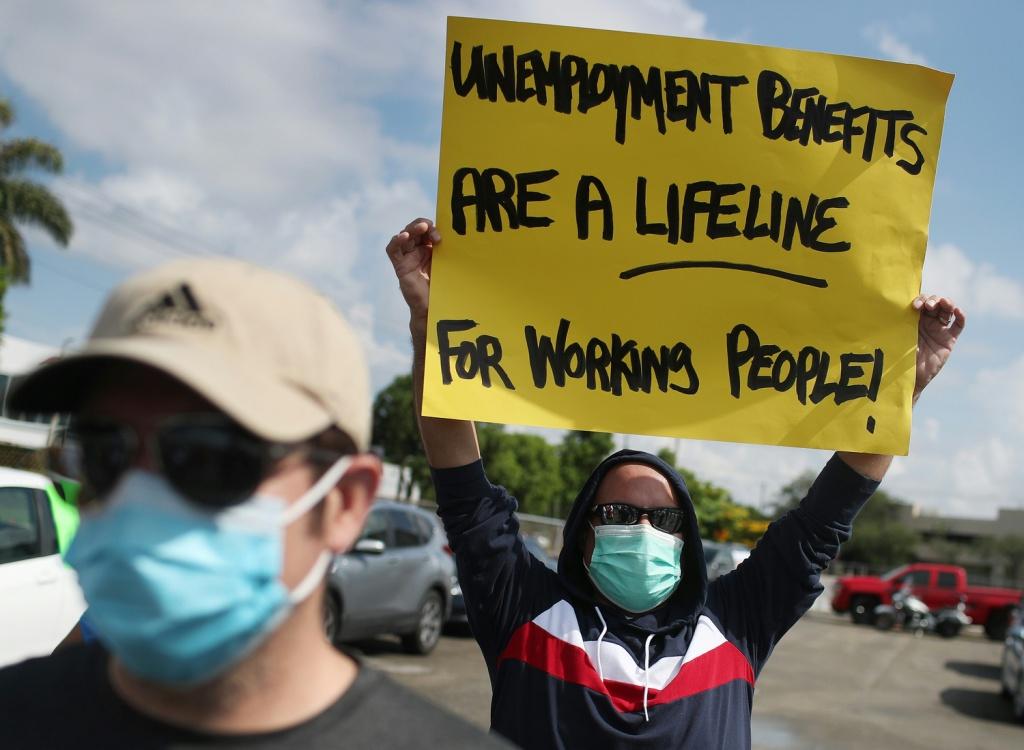President Joe Biden on Friday seized on feeble US employment data to argue the world's largest economy needs his $1.9 trillion pandemic relief package, which cleared a key Senate hurdle without support from the Republican opposition.
The closely-watched jobs data showed the unemployment rate dropped to 6.3 percent in January, but the economy added only 49,000 jobs, the Labor Department said.
The anemic report made plain the ongoing struggles in the United States as Americans cope with the largest Covid-19 outbreak in the world.
"I believe the American people are looking right now to their government for help," Biden said after a meeting with top Democratic lawmakers. "So I'm going to act, I'm going to act fast."
Democratic House Speaker Nancy Pelosi said she would push for rapid approval of the package.
"Hopefully in a two-week period of time, we'll send something over to the Senate," she told reporters after the White House meeting.
The House of Representatives approved a budget proposal by a narrow margin on Friday, following Senate Democrats who in the wee hours of the morning won a procedural vote setting the stage for passage of the president's relief bill.
The package includes a host of measures aimed at boosting the recovery including aid to small businesses and the unemployed, and funds to speed up vaccine distribution to contain the pandemic.
But in a sign of just how narrow a path to approval, Vice President Kamala Harris cast the tie-breaking vote to overcome the objections of Republicans, who have balked at the high price tag.
Biden has shrugged off the criticism.
"The way I see it, the biggest risk is not going too big," he said.
Biden's efforts received a big endorsement, when IMF chief Kristalina Georgieva offered her support for the plan, and rejected the notion it was excessive.
"The US does have fiscal space to take additional relief and support measures," she told reporters Friday.
And it is "appropriate" to use that firepower "given the exceptional uncertainties, and most importantly, given the fact that there is still a lot of pain for households and businesses."
Analysts warn the monthly employment report indicates the economic recovery remains tied to the intensity of the coronavirus pandemic.
"Hiring will pick up as restrictions are relaxed but gains will be stronger once the economy can fully reopen," Rubeela Farooqi of High Frequency Economics said.
"Until then, generous fiscal support will provide a safety net for households and businesses."
The United States last year endured its worst economic contraction since 1946, and the recovery has been uneven, with some sectors like housing bouncing back more quickly while other areas, such as travel and entertainment, are still suffering.
Unemployment in the world's largest economy was at historically low rates before the pandemic struck, when massive business closures drove the jobless rate up to 14.7 percent.
It has declined in the months since, as some activity resumed, but at a progressively slower pace, and hiring in December fell.
There were warning signs for the economy throughout the latest data, which showed the workforce is 6.5 percent -- 9.9 million positions -- smaller than it was in February before the pandemic struck.
At 61.4 percent, the labor force participation rate in January was at a level not seen since the 1970s, and Gregory Daco of Oxford Economics said adjustments meant to account for holiday-related employment trends made the data appear better than it is.
"While favorable seasonal factors helped lift the monthly jobs count, the January gain nonetheless represented little progress toward recovery," he said.
The number of long-term unemployed people rose to just over four million, or 39.5 percent of all jobless workers, which William Spriggs, chief economist of the AFL-CIO trade union federation, warned was a sign of a persistent employment crisis.
"These show it will be very hard to get the unemployment number down. We need help now to slow that growth," he tweeted.
Job growth was strongest in the business services and private and public education sectors, but continued layoffs in industries like retail trade, health care and especially the hard-hit leisure and hospitality sector undercut the gains.
The pain was not spread evenly across the country, with whites and Hispanics seeing their unemployment rates decline, while for Black Americans, the rate fell -- but to a still-high 9.2 percent.
Copyright AFP. All rights reserved.


